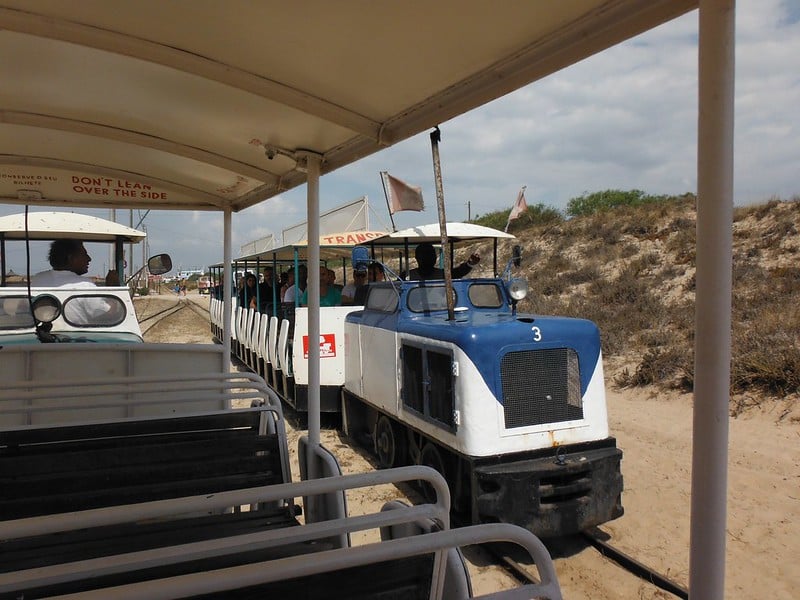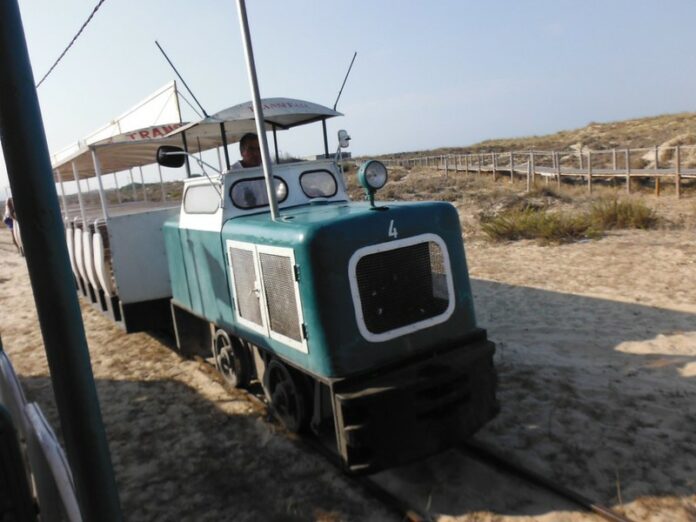The rhythmic sound of a small train chugging through the sand dunes, the salty breeze in your face, and the promise of sun-soaked beaches ahead—this was the charm of the Caparica Beach Train. For decades, this classic narrow-gauge railway transported locals and tourists from the center of Costa da Caparica to its string of beautiful beaches. But since the train was decommissioned in 2020, a sense of nostalgia has lingered, sparking a growing chorus calling for its return.
But the future is bright as the famous Transpraia da Caparica was recently bought by a French investor, and there is hope that it may resume operations soon. This revival, in my opinion, would be a win for Portugal, its environment, and the region’s tourism.
An Iconic Piece of History
The Caparica Beach Train, known affectionately as the “Transpraia,” should be brought back because it was more than just a ride along the beach, it was a unique cultural experience. The train, which ran from the mid-20th century until its final journey in 2020, was a beloved feature of Costa da Caparica. For 60 years, it journeyed back and forth along a 9-kilometer route, passing through sandy stretches from Fonte da Telha to the village center of Costa da Caparica, with 15 stops along the way.
For older generations, the train evokes fond memories of summer holidays, and for younger people, it represents a connection to Portugal’s laid-back beach culture. Reviving the train would allow new generations to experience this classic piece of local heritage.
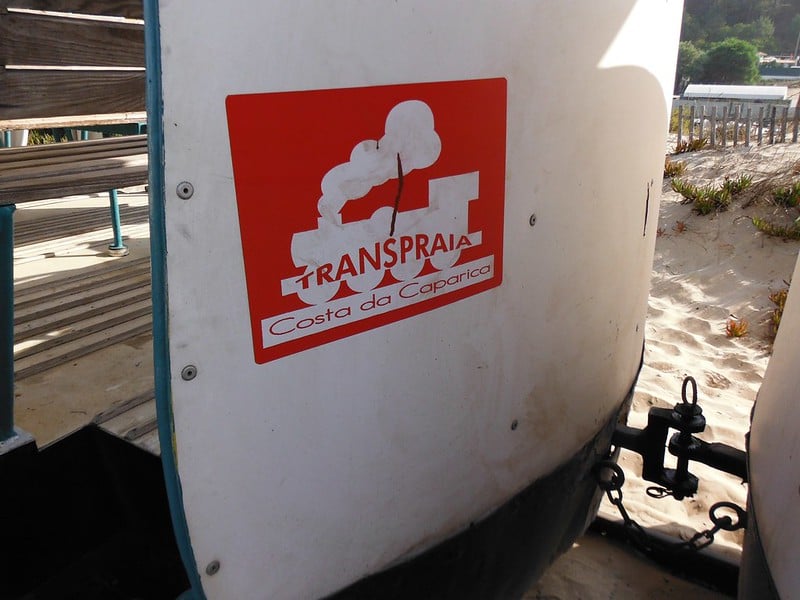
Plans to Bring the Train Back
In a surprising turn of events, a French investor who has lived in Portugal for seven years, decided to purchase the defunct Transpraia after witnessing its slow, painful decline. Having already invested nearly one million euros in the project, this new investor is determined to breathe new life into the Transpraia. The train’s carriages, currently stored in a warehouse, are being carefully restored, though getting them back into shape after years spent in storage will definitely require some effort.
The new vision for the future of Transpraia focuses heavily on sustainability, with a plan to reduce the number of vehicles clogging the beach access roads, which could in turn lower pollution and protect the delicate coastal environment. Furthermore, the new investor hopes to integrate the train with other forms of public transportation and make it a key part of a greener, more accessible beach experience.
However, there is still work to be done. The full route between Costa da Caparica and Fonte da Telha is not yet operational, but the project is well underway and the restoration team is currently working to recover the train’s former glory. Angelo, the son of one of the train’s founding employees, recalls the golden days of the Transpraia with fondness and supports the initiative, even as he regrets the divestment that led to its decline.
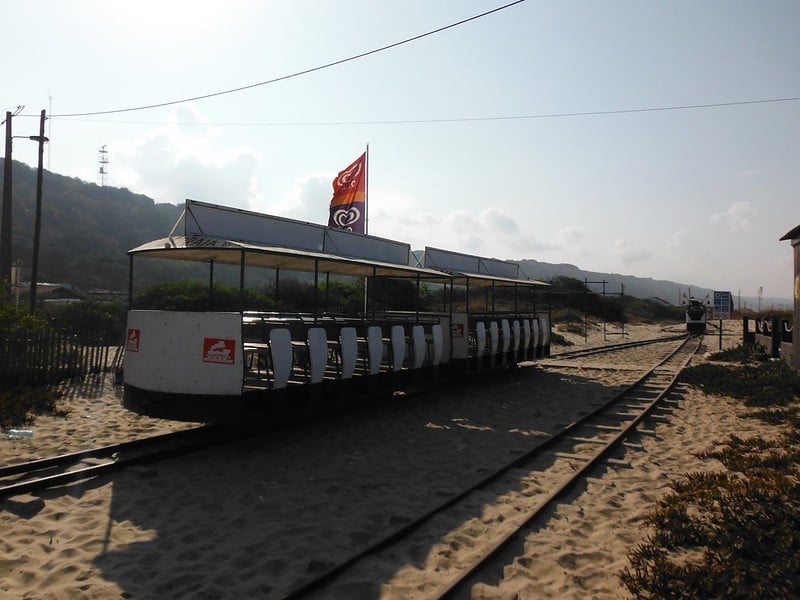
Sustainable and Environmentally Friendly
One of the most compelling reasons to bring back the Caparica Beach Train is its environmental benefits. The coastline of Caparica, located just a short distance from Lisbon, sees a high volume of visitors, especially in the summer months. With thousands of people flocking to the beaches, the local roads often become congested, resulting in increased pollution and a larger carbon footprint.
Reintroducing a low-emission train system could significantly reduce the number of cars on the road. Trains, particularly when powered by renewable energy, are one of the most efficient and environmentally friendly forms of transportation. By offering a convenient and sustainable way to access the beaches, the Caparica Train could play a key role in promoting eco-friendly tourism.
Easing Traffic and Improving Access
During peak season, the roads leading to the beaches of Costa da Caparica are often jam-packed with cars. This not only creates stress for visitors but also negatively impacts the quality of life for local residents. Many people opt to drive because public transport options are limited, and walking long distances to reach the more remote beaches can be inconvenient, especially for families.
A revived Caparica Beach Train would provide a hassle-free alternative to driving, reducing road congestion and making the beaches more accessible to everyone. Families with children, older visitors, and those who simply want to enjoy a more relaxed way of reaching the coastline would all benefit from the convenience of the train.
Boosting Local Tourism and Economy
Like it or not, tourism is a cornerstone of Portugal’s economy, and Costa da Caparica is no exception. With its wide golden stretches of sand and proximity to Lisbon, the region attracts visitors from across Europe and beyond. However, the loss of the Caparica Train removed one of the area’s unique attractions.
Reintroducing the train could not only draw more tourists but also encourage them to stay longer and explore more of the local area. It would add a charming and novel experience to a day at the beach, making Costa da Caparica stand out even more on the tourist map. Local businesses, from beachside restaurants to surf shops, would also benefit from the increase in foot traffic that the train would bring.
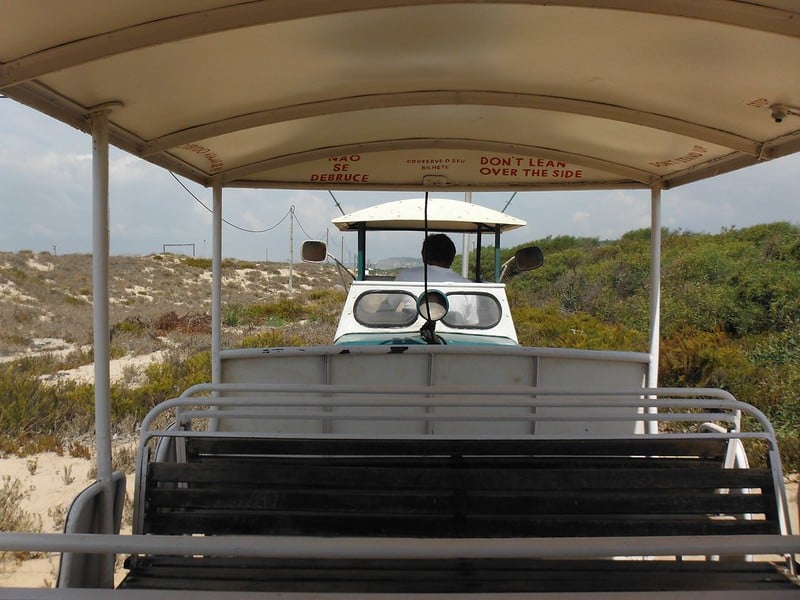
Preserving Natural Beauty and Reducing Coastal Erosion
One of the challenges facing Costa da Caparica is coastal erosion. With the growing number of visitors and the development pressures on the beachfront, maintaining the delicate balance of the natural environment is crucial. The Caparica Beach Train followed a track that was less invasive than new road infrastructure might be, which makes it a more sustainable option for the environment.
By reintroducing the train, authorities could better manage the number of vehicles in the area, thereby minimizing the strain on the beaches and reducing the erosion that comes from constant car traffic. Furthermore, proper management of the train route could ensure that it does not interfere with sensitive dune ecosystems while providing a scenic route for passengers.
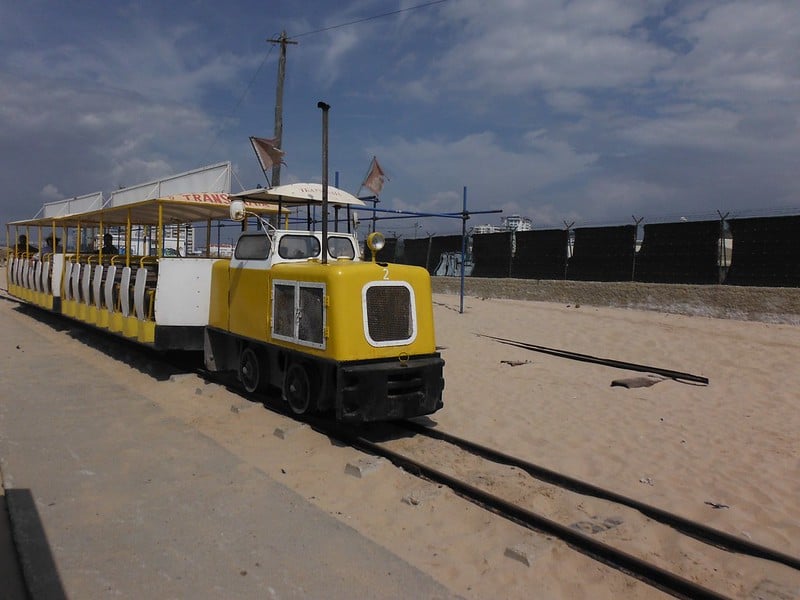
The Role of European Union Funding
While a new investor on board and passion for the project have brought new hope for the Transpraia’s return, the project still depends on further funding and approvals. Discussions are ongoing with various entities, including the potential for European Union funds, which could accelerate the completion of the project. These funds would ensure that the train not only returns but does so in a way that aligns with modern sustainability goals and public transport improvements.
All Aboard for the Future
As Portugal continues to focus on sustainable tourism, the Caparica Beach Train represents an opportunity to blend history, environmental stewardship, and convenience. Bringing back the train would not only revive a cherished tradition but also serve as a smart, forward-thinking solution to the challenges facing Costa da Caparica’s tourism and transport systems.
With its unique mix of culture, sustainability, and the renewed vision of its new owner, the Transpraia could soon be chugging through the dunes once again—this time with a greener, brighter future on the horizon.
